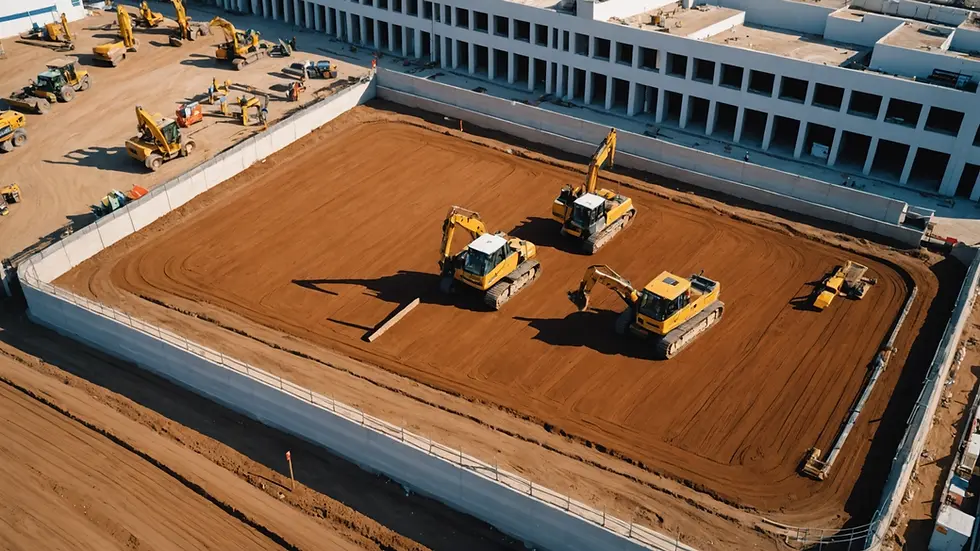Commercial Real Estate Feasibility Studies
- tmiller813
- Feb 28, 2025
- 4 min read
Updated: May 9, 2025
In the fast-paced world of commercial real estate, conducting a feasibility study is not just beneficial—it’s essential.
These studies provide vital insights that guide decision-making and shape the future of every real estate project.
Whether you are an investor, developer, or other stakeholder, understanding what a feasibility study entails can dramatically influence your project's success.
What is a Commercial Real Estate Feasibility Study?
A commercial real estate feasibility study is a detailed analysis aimed at determining the viability of a real estate project.
This involves evaluating various factors such as market conditions, financial performance, regulatory constraints, and potential risks.
The main objective is to assess whether a proposed project merits pursuit, helping stakeholders make informed investment decisions.
The feasibility study process involves thorough market research, financial projections, and risk assessment.
It usually results in a comprehensive report that outlines findings and suggests the most prudent path forward.
Key Components of a Feasibility Study
Market Analysis
Market analysis is a vital part of a feasibility study. Analysts assess current market conditions by looking at supply and demand, competition, and target demographics.
For example, if a feasibility study reveals that the demand for office space in a specific area has grown by 25% over the past year, this suggests a potential market opportunity for new developments.
Understanding market dynamics empowers stakeholders to determine if there is enough demand for the proposed project.
Insights gained from this analysis can enhance the project’s positioning and increase the likelihood of success.
Financial Projections
Financial projections are crucial for evaluating the economic viability of a commercial real estate project.
This includes examining potential revenues, costs, financing options, and the expected return on investment (ROI).
For instance, if projections indicate that a new retail center could generate $1 million in annual revenue with a 15% profit margin, it becomes easier for developers to attract investors.
Clear, realistic financial forecasts are critical for securing funding.
Site Evaluation
Choosing the right location is often a key determinant of a project's success.
Site evaluation looks at physical attributes such as topography, zoning laws, and accessibility.
For example, if a potential site is located close to a major highway or public transit, it might offer better customer access.
Additionally, assessing the area's existing infrastructure, such as utilities and transportation, helps stakeholders determine the site's suitability for its intended purpose.
Regulatory Considerations
Navigating regulatory frameworks is essential in any commercial real estate project.
This involves understanding zoning laws, building codes, and environmental regulations that could affect the project.
By evaluating regulations early in the feasibility study, stakeholders can avoid costly delays later.
For example, knowing that a site falls within a flood zone can influence both project planning and execution.
Compliance with local regulations streamlines the path to project completion.
Risk Assessment
Every investment includes risks. The risk assessment section of a feasibility study evaluates potential hurdles that could jeopardize the project.
This includes factors like economic downturns or shifts in market demand.
A thorough risk assessment enables stakeholders to create mitigation strategies, minimizing their financial exposure.
For instance, if market analysis shows historical volatility in an area, establishing contingency plans can protect against sudden downturns.
Importance of Feasibility Studies
Conducting a feasibility study is crucial for several reasons:
Informed Decision-Making: With data-driven insights, stakeholders can make confident choices based on factual evidence, avoiding blind assumptions.
Resource Allocation: Identifying strong projects allows organizations to allocate their resources optimally, focusing on opportunities that promise the highest returns.
Attracting Investors: A well-prepared feasibility study boosts investor confidence, making it easier to secure funding and garner support for the project.
Minimizing Risks: Recognizing risks enables stakeholders to prepare for potential challenges, ensuring they have strong strategies in place to handle issues proactively.
Steps to Conduct a Feasibility Study
Define Scope: Clarify the objectives and parameters of the study to focus your research effectively.
Data Collection: Gather relevant information through market research, surveys, and financial data analysis.
Analysis: Examine the collected data to draw insights about market trends, financial performance, and site evaluation.
Reporting: Prepare a comprehensive report summarizing findings along with recommendations for the project.
Review and Revise: Share the report with stakeholders for feedback, making necessary adjustments based on their input.
Timeline and Costs
The timeline for completing a feasibility study can vary based on the project's complexity. Typically, studies may take anywhere from a few weeks to several months.
Costs can also differ widely, influenced by factors such as scope, location, and consulting expertise.
Investing in a comprehensive feasibility study may require upfront costs, but the long-term advantages can far outweigh these initial expenditures.
Final Thoughts
In conclusion, commercial real estate feasibility studies are vital for ensuring project success.
By providing thorough market analyses, accurate financial forecasts, site evaluations, and risk assessments, these studies empower stakeholders to make informed decisions that impact their investments.
As the commercial real estate landscape continues to change, the importance of conducting a rigorous feasibility study only increases.
By emphasizing due diligence and utilizing data-driven insights, stakeholders can promote sustainable growth and adeptly navigate the complexities of the real estate market.




Comments